 This part of the Bible was straightforward reading, easy to understand, and likely not so easy to live out. We are all human just like the people written about in this part of the Bible.
This part of the Bible was straightforward reading, easy to understand, and likely not so easy to live out. We are all human just like the people written about in this part of the Bible.
Man is about to die and consults the wrong god.
The Right God is angered and very jealous. There is only one God of Israel—God the Father, Jesus Christ His Son, and The Holy Spirit. Amen. Al-le-lu-ia!
Ochozias: Go, consult Beelzebub, the god of Accaron, whether I shall recover of this my illness.
Lord to Elias: Arise, and go up to meet the messengers of the king of Samaria (Ochozias), and say to them: Is there not a God in Israel, that ye go to consult Beelzebub the god of Accaron?
And the angel of the Lord spoke to Elias, saying: Go down with him, fear not, He arose therefore, and went down with him to the king (Ochozias), and he said to him: Thus saith the Lord: Because thou has sent messengers to consult Beelzebub the god of Accaron, as though there was not a God in Israel, of whom thou mightiest inquire the word; therefore from the bed on which thou are gone up, thou shalt not come down, but thou shalt surely die.
 So he (Ochozias) dies according to the word of the Lord which Elias spoke, and Joram his brother reigned in his stead.
So he (Ochozias) dies according to the word of the Lord which Elias spoke, and Joram his brother reigned in his stead.
Here is a good tip for living and acquiring wisdom: Ask for the right thing, be persistent and don’t every bully another human being!
Eliseus to Elias: As the Lord liveth, and as thy soul liveth, I will not leave thee.
Sons of the prophets to Eliseus: Dost thou know that this day the Lord will take away thy master from thee? And he (Eliseus) answered: I also know it: hold your peace.
Eliseus to Elias in Jericho: As the Lord liveth, and as thy soul liveth, I will not leave thee.
Eliseus to Elias at the Jordan: As the Lord liveth, and as thy soul liveth, I will not leave thee.
Elias to Eliseus: Ask what thou wilt have me to do for thee, before I be taken away from thee. And Eliseus said: I beseech thee that in me may be thy double spirit. And as they walked together, a fiery chariot, and fiery horses parted them both asunder; and Elias went up by a whirlwind into heaven.
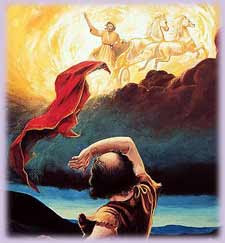 And Eliseus saw him, and cried: My father, my father, the chariot of Israel, and the driver thereof…
And Eliseus saw him, and cried: My father, my father, the chariot of Israel, and the driver thereof…
And he (Eliseus) took up the mantle of Elias, that fell from him… And he struck the waters with the mantle of Elias… and they were not divided.
Eliseus said: Where is now the God of Elias?
And he struck the waters, and they were divided, hither and thither, and Eliseus passed over.
Little boys came out of the city (of Bethel) and mocked him (Eliseus), saying: Go up, thou bald head; go up, thou bald head. And looking back, he saw them, and cursed them in the name of the Lord: and there came forth two bears out of the forest, and tore of them two and forty boys…
And when you make a deal (a league in biblical times) keep your deal or it may cost you more than the sheep, it may cost you the life of your son!
Now Mesa, king of Moab, nourished many sheep, and he paid to the king of Israel a hundred thousand lambs, and a hundred thousand rams with their fleeces. And when Achab was dead, he broke the league which he had made with the king of Israel.
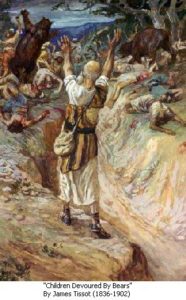 Eliseus: But now bring me hither a minstrel. And when the minstrel played, the hand of the Lord came upon him (Eliseus), and he said: Thus saith the Lord: Make the channel of this torrent full of ditches… You shall not see wind, nor rain: and yet this channel shall be filled with water, and you shall drink, you and your families, and your beasts.
Eliseus: But now bring me hither a minstrel. And when the minstrel played, the hand of the Lord came upon him (Eliseus), and he said: Thus saith the Lord: Make the channel of this torrent full of ditches… You shall not see wind, nor rain: and yet this channel shall be filled with water, and you shall drink, you and your families, and your beasts.
Eliseus: and this is a small thing in the sight of the Lord; moreover he will deliver also Moab into your hands.
…the Moabites saw the waters over against them red, like blood, and they said: It is the blood of the sword: the kings have fought among themselves, and they have killed one another: go now, Moab, to the spoils.
And they being conquerors (camp of Israel), went and smote Moab… and the city was beset by slingers, and a great part thereof destroyed.
Then he (the king of Moab) took his eldest son that should have reigned in his stead, and offered him for a burnt offering upon the wall: and there was great indignation in Israel, and presently they departed from him, and returned to their own country.
Know that the Lord takes care of people in many ways, including the miracles of multiplication of the widow’s oil; a barren birth and revival of a dead child; bitter pottage made sweet; multiplication of 20 loaves of bread to feed a hundred men with leftovers; and leprosy taken from a humble man and given to a deceiving servant:
 Now a certain woman of the wives of the prophets cried to Eliseus, saying, Thy servant my husband is dead… and behold the creditor is come to take away my two sons to serve him… I thy handmaid have nothing in my house but a little oil, to anoint me.
Now a certain woman of the wives of the prophets cried to Eliseus, saying, Thy servant my husband is dead… and behold the creditor is come to take away my two sons to serve him… I thy handmaid have nothing in my house but a little oil, to anoint me.
Eliseus to the woman: Go, borrow of all thy neighbors empty vessels not a few… And go in, and shut thy door, when thou art within, and thy sons: and pour out thereof into all those vessels… Go sell the oil, and pay thy creditor: and thou and thy sons live of the rest.
A great woman of Sunam: I perceive that this is a holy man of God (Eliseus), who often passeth by us. Let us therefore make him a little chamber, and put a little bed in it for him, and a table, and a stool, and a candlestick, that when he cometh to us, he may abide there…
Eliseus to his servant Giezi say to her: Behold thou hast diligently served us in all things, what wilt thou have me to do for thee?
She answered: I dwell in the midst of my people.
Giezi to Eliseus: Do not ask, for she hath no son, and her husband is old.
Eliseus to servant Geizito woman: At this time, and this same hour, if life accompany, thou shalt have a son in thy womb… And the woman conceived, and brought forth a son in the time, and at the same hour, that Eliseus had said.
Child to father: My head acheth, my head acheth…
Father to servant: Take him, and carry him to his mother.
She set him on her knees until noon, and then he died.
Woman to husband: Send with me, I beseech thee, one of thy servants, and an ass that I may run to the man of God, and come again.
Father to woman: Why dost thou go to him? To day is neither new moon nor Sabbath.
Man of God (Eliseus): Let her alone for her soul is in anguish, and the Lord hath hid it from me, and hath not told me.
Eliseus to servant Giezi: lay my staff upon the face of the child…
Mother to Eliseus: As the Lord liveth, and as the soul liveth, I will not leave thee…
Giezi was gone before them, and laid the staff upon the face of the child… The child is not risen…
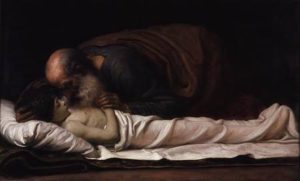
And going in he (Eliseus) shut the door upon him, and upon the child, and prayed to the Lord. And he went up, and lay upon the child: and he put his mouth upon his mouth, and his eyes upon his eyes, and his hands upon his hands” and he bowed himself upon him, and the child’s flesh grew warm… and the child gaped seven times, and opened his eyes… She (the mother) came and fell at his feet, and worshipped upon the ground: and took up her son, and went out.
Eliseus to one of his servants: Set on the great pot, and boil pottage for the sons of the prophets. And one (servant) went out into the field to gather… wild herbs…. wild vine… wild gourds… for he knew not what it was…
…when they had tasted of the pottage, they cried out, saying: Death is in the pot, O man of God. And they could not eat thereof.
Eliseus said: Bring some meal… he cast it in the pot… and there was now no bitterness in the pot…
And a certain man came from Baalsalisa… bringing twenty loaves…
Eliseus said: Give to the people that they may eat… his servant answered him: before one hundred men? They shall eat, and there shall be left. So he set it before them: and they ate, and there was left according to the word of the Lord…
 Naaman, general of the army of the king of Syria…he was a valiant man and rich, but a leper.
Naaman, general of the army of the king of Syria…he was a valiant man and rich, but a leper.
Eliseus sent a messenger to Naaman: Go, and wash seven times in the Jordan, and thy flesh shall recover health, and thou shalt be clean.
Naaman was angry and went away, saying: I thought he would have come out to me, and standing would have invoked the name of the Lord his God, and touched with his hand the place of the leprosy, and healed me… So he returned, and was going away with indignation…
Naaman’s servants to Naaman: Father, if the prophet had bid thee do some great thing, surely thou shouldst have done it; how much rather what he now hath said to thee…
Then Naaman went down, and washed in the Jordan seven times: according to the word of the man of God, and his flesh was restored, like the flesh of a little child, and he was made clean.
Naaman to Eliseus: In truth, I know there is no other God in all the earth, but only in Israel. I beseech thee therefore take a blessing (gift) of thy servant.
Eliseus to Naaman: As the Lord liveth, before whom I stand, I will receive none.
So he (Naaman) departed from him in the springtime of the earth.
Giezi: I will run after him (Naaman), and take something of him…
 Giezi to Naaman: Well: my master hath sent me to thee saying… two young men of the sons of the prophets: give them a talent of silver, and two changes of garments…
Giezi to Naaman: Well: my master hath sent me to thee saying… two young men of the sons of the prophets: give them a talent of silver, and two changes of garments…
Eliseus to Giezi: Whence comest thou, Giezi? …Was not my heart present, when the man (Naaman) turned back from his chariot to meet thee? But the leprosy of Naaman shall also stick to thee, and to thy seed forever.
And he (Giezi) went out from him a leper as white as snow.
Miracles abound for us; yet humans all are we in need of one miracle!

Day 125: Reading The Bible with a TROML Perspective; Miracles Abound for Us; Yet Humans All are We!
Read and inspired by the Old Testament, The Fourth Book of Kings Chapters 1-5.
Bible Notes:
This Book continues the history of the two hostile kingdoms, Israel and Juda, up to their captivity. The Assyrians in 722 B.C. led Israel away; the Babylonians in 586 B.C. led Juda into captivity.
4 Kings Chapter 1: Moab rebels; Ochozias tries to consult Beelzebub; Elias predicts the death of Ochozias; Elias twice brings fire from heaven; Elias visits Ochozias; Joram succeeds Ochozias.
And Moab rebelled against Israel, after the death of Achab.
Ochozias: Go, consult Beelzebub, the god of Accaron, whether I shall recover of this my illness.
Lord to Elias: Arise, and go up to meet the messengers of the king of Samaria (Ochozias), and say to them: Is there not a God in Israel, that ye go to consult Beelzebub the god of Accaron?
Messengers to Ochozias: Thus saith the Lord: Is it because there was no God in Israel that thou sendest to Beelzebub the god of Accaron? Therefore thou shalt not come down from the bed, on which thou are gone up, but thou shalt surely die.
Ochozias: It is Elias the Thesbite.
And he (Ochozias) sent to him a captain fifty, and the fifty men that were under him: Man of God (Elias), the king hath commanded that thou come down.
Elias to the captain: If I be a man of God, let fire come down from heaven, and consume thee, and thy fifty.
And there came down fire from heaven, and consumed him, and the fifty that were with him.
And again he (Ochozias) sent to him (Elias) another captain of fifty men, and his fifty with him.
Elias answered: If I be a man of God, let fire come down from heaven, and consume thee, and thy fifty.
And fire came down fire from heaven, and consumed him, and his fifty.
Ochozias sent a third captain of fifty men, and the fifty that were with him.
And when he (Elias) was come, he fell upon his knees, before Elias, and besought him, and said: Man of God despise not my life… but now I beseech thee to spare my life.
And the angel of the Lord spoke to Elias, saying: Go down with him, fear not, He arose therefore, and went down with him to the king, and he said to him: Thus saith the Lord: Because thou has sent messengers to consult Beelzebub the god of Accaron, as though there was not a God in Israel, of whom thou mightiest inquire the word; therefore from the bed on which thou are gone up, thou shalt not come down, but thou shalt surely die.
So he (Ochozias) dies according to the word of the Lord which Elias spoke, and Joram his brother reigned in his stead.
4 Kings Chapter 2: Eliseus refuses to depart from Elias; Elias divides the Jordan; Elias taken up to heaven; Eliseus divides the Jordan; Sons of the prophets worship Eliseus; Eliseus heals the water; Bears destroy the boys who mock Eliseus.
And it came to pass, when the Lord would take Elias into heaven by a whirlwind…
Eliseus to Elias: As the Lord liveth, and as thy soul liveth, I will not leave thee.
Sons of the prophets to Eliseus: Dost thou know that this day the Lord will take away thy master from thee? And he (Eliseus) answered: I also know it: hold your peace.
Eliseus to Elias in Jericho: As the Lord liveth, and as thy soul liveth, I will not leave thee.
Sons of the prophets to Eliseus in Jericho: Dost thou know that this day the Lord will take away thy master from thee? And he (Eliseus) answered: I also know it: hold your peace.
Eliseus to Elias at the Jordan: As the Lord liveth, and as thy soul liveth, I will not leave thee.
And Elias took his mantle, and folded it together, and struck the waters, and they were divided hither and thither, and they both passed over dry ground.
Elias to Eliseus: Ask what thou wilt have me to do for thee, before I be taken away from thee. And Eliseus said: I beseech thee that in me may be thy double spirit. And he (Elias) answered: Thou hast asked for a hard thing: nevertheless if thou see me when I am taken from thee, thou shalt have what thou asked: but if thou see me not, thou shalt not have it.
And as they walked together, a fiery chariot, and fiery horses parted them both asunder; and Elias went up by a whirlwind into heaven.
And Eliseus saw him, and cried: My father, my father, the chariot of Israel, and the driver thereof…
And he (Eliseus) took up the mantle of Elias, that fell from him… And he struck the waters with the mantle of Elias… and they were not divided.
Eliseus said: Where is now the God of Elias?
And he struck the waters, and they were divided, hither and thither, and Eliseus passed over.
Sons of the prophets: The spirit of Elias hath rested upon Eliseus…seek thy master (Elias), lest perhaps the spirit of the Lord hath taken him up and cast him upon some mountain or into some valley… And they sent fifty men: and they sought three days but found him not…
Men of Jericho to Eliseus: but the waters are very bad, and the ground barren…
Eliseus: This saith the Lord: I have healed these waters, and there shall be no more in them death or barrenness.
Little boys came out of the city (of Bethel) and mocked him (Eliseus), saying: Go up, thou bald head; go up, thou bald head. And looking back, he saw them, and cursed them in the name of the Lord: and there came forth two bears out of the forest, and tore of them two and forty boys…
4 Kings Chapter 3: Joram’s reign in Israel; King Mesa’s rebellion; Three kings visit Eliseus; Eliseus procures water without rain; Eliseus foretells victory; The Israelites defeat the Moabites.
And Joram the son of Achab reigned over Israel in Samaria in the eighteenth year of Josaphat king of Juda. And he (Joram) reigned twelve years. And he did evil before the Lord, but not like his father and his mother: for he took away the statues of Baal, which his father had made. Nevertheless he struck to the sins of Jeroboam… who made Israel to sin, nor did he depart from them.
Now Mesa, king of Moab, nourished many sheep, and he paid to the king of Israel a hundred thousand lambs, and a hundred thousand rams with their fleeces. And when Achab was dead, he broke the league which he had made with the king of Israel.
Joram king of Israel to Josaphat king of Juda: The king of Moab is revolted from me, come with me against him to battle
Josaphat to Joram: I will come up: he that is mine is thine: my people, thy people: and my horses, thy horses.
Joram, Josaphat and the king of Edom went, and they fetched a compass of seven days’ journey (by the desert of Edom)…
Joram: Alas, alas, alas, the Lord hath gathered us three kings together, to deliver us into the hands of Moab!
Here is Eliseus… who poured water on the hands of Elias…
Eliseus: But now bring me hither a minstrel. And when the minstrel played, the hand of the Lord came upon him (Eliseus), and he said: Thus saith the Lord: Make the channel of this torrent full of ditches… You shall not see wind, nor rain: and yet this channel shall be filled with water, and you shall drink, you and your families, and your beasts.
Eliseus: and this is a small thing in the sight of the Lord; moreover he will deliver also Moab into your hands.
…the Moabites saw the waters over against them red, like blood, and they said: It is the blood of the sword: the kings have fought among themselves, and they have killed one another: go now, Moab, to the spoils.
And they being conquerors (camp of Israel), went and smote Moab… and the city was beset by slingers, and a great part thereof destroyed.
Then he (the king of Moab) took his eldest son that should have reigned in his stead, and offered him for a burnt offering upon the wall: and there was great indignation in Israel, and presently they departed from him, and returned to their own country.
4 Kings Chapter 4: Eliseus multiplies the widow’s oil; Eliseus promises a son to the Sunamitess; The son of the Sunamitess dies; She goes to Eliseus; Eliseus sees the dead child; Eliseus raises the child to life; Bitter pottage made sweet; Eliseus multiplies the bread.
Now a certain woman of the wives of the prophets cried to Eliseus, saying, Thy servant my husband is dead… and behold the creditor is come to take away my two sons to serve him… I thy handmaid have nothing in my house but a little oil, to anoint me.
Eliseus to the woman: Go, borrow of all thy neighbors empty vessels not a few… And go in, and shut thy door, when thou art within, and thy sons: and pour out thereof into all those vessels… Go sell the oil, and pay thy creditor: and thou and thy sons live of the rest.
A great woman of Sunam: I perceive that this is a holy man of God (Eliseus), who often passeth by us. Let us therefore make him a little chamber, and put a little bed in it for him, and a table, and a stool, and a candlestick, that when he cometh to us, he may abide there…
Eliseus to his servant Giezi say to her: Behold thou hast diligently served us in all things, what wilt thou have me to do for thee?
She answered: I dwell in the midst of my people.
Giezi to Eliseus: Do not ask, for she hath no son, and her husband is old.
Eliseus to servant Geizito woman: At this time, and this same hour, if life accompany, thou shalt have a son in thy womb… And the woman conceived, and brought forth a son in the time, and at the same hour, that Eliseus had said.
Child to father: My head acheth, my head acheth…
Father to servant: Take him, and carry him to his mother.
She set him on her knees until noon, and then he died.
Woman to husband: Send with me, I beseech thee, one of thy servants, and an ass that I may run to the man of God, and come again.
Father to woman: Why dost thou go to him? To day is neither new moon nor Sabbath.
Man of God (Eliseus): Let her alone for her soul is in anguish, and the Lord hath hid it from me, and hath not told me.
Eliseus to servant Giezi: lay my staff upon the face of the child…
Mother to Eliseus: As the Lord liveth, and as the soul liveth, I will not leave thee…
Giezi was gone before them, and laid the staff upon the face of the child… The child is not risen…
And going in he (Eliseus) shut the door upon him, and upon the child, and prayed to the Lord. And he went up, and lay upon the child: and he put his mouth upon his mouth, and his eyes upon his eyes, and his hands upon his hands” and he bowed himself upon him, and the child’s flesh grew warm… and the child gaped seven times, and opened his eyes… She (the mother) came and fell at his feet, and worshipped upon the ground: and took up her son, and went out.
Eliseus to one of his servants: Set on the great pot, and boil pottage for the sons of the prophets. And one (servant) went out into the field to gather… wild herbs…. wild vine… wild gourds… for he knew not what it was…
…when they had tasted of the pottage, they cried out, saying: Death is in the pot, O man of God. And they could not eat thereof.
Eliseus said: Bring some meal… he cast it in the pot… and there was now no bitterness in the pot…
And a certain man came from Baalsalisa… bringing twenty loaves…
Eliseus said: Give to the people that they may eat… his servant answered him: before one hundred men? They shall eat, and there shall be left. So he set it before them: and they ate, and there was left according to the word of the Lord…
4 Kings Chapter 5: Naaman goes to Samaria to see Eliseus; Naaman is healed of leprosy; Eliseus refuses Naaman’s gifts; Giezi’s avarice; Giezi’s punishment.
Naaman, general of the army of the king of Syria…he was a valiant man and rich, but a leper.
Little maid, led captive out of the land of Israel to Naaman: I wish my master had been with the prophet, that is in Samaria: he would certainly have healed him of leprosy which he hath.
King of Syria to Naaman: Go, and I will send a letter to the king of Israel. And he (Naaman) departed, and took with him ten talents of silver, and six thousand pieces of golf, and ten changes of a raiment.
When the king of Israel read the letter, he rent his garments, and said: Am I God, to be able to kill and give life, that this man hath sent to me, to heal a man of his leprosy? Mark, and see how he seeketh occasions against me.
Eliseus to the king of Israel: Why hast thou rent thy garments? Let him come to me, and let him know that there is a prophet in Israel.
Eliseus sent a messenger to Naaman: Go, and wash seven times in the Jordan, and thy flesh shall recover health, and thou shalt be clean.
Naaman was angry and went away, saying: I thought he would have come out to me, and standing would have invoked the name of the Lord his God, and touched with his hand the place of the leprosy, and healed me… So he turned, and was going away with indignation…
Naaman’s servants to Naaman: Father, if the prophet had bid thee do some great thing, surely thou shouldst have done it; how much rather what he now hath said to thee…
Then Naaman went down, and washed in the Jordan seven times: according to the word of the man of God, and his flesh was restored, like the flesh of a little child, and he was made clean.
Naaman to Eliseus: In truth, I know there is no other God in all the earth, but only in Israel. I beseech thee therefore take a blessing (gift) of thy servant.
Eliseus to Naaman: As the Lord liveth, before whom I stand, I will receive none.
So he (Naaman) departed from him in the springtime of the earth.
Giezi: I will run after him (Naaman), and take something of him…
Giezi to Naaman: Well: my master hath sent me to thee saying… two young men of the sons of the prophets: give them a talent of silver, and two changes of garments…
Eliseus to Giezi: Whence comest thou, Giezi? …Was not my heart present, when the man (Naaman) turned back from his chariot to meet thee? But the leprosy of Naaman shall also stick to thee, and to thy seed forever.
And he (Giezi) went out from him a leper as white as snow.
 Now… Paul… came to Euphesus… and found certain disciples…
Now… Paul… came to Euphesus… and found certain disciples…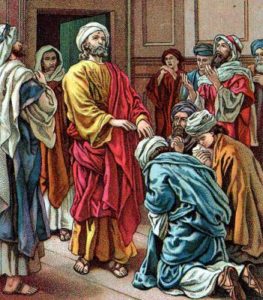 On hearing this they were baptized in the name of the Lord Jesus; and when Paul laid his hands on them, the Holy Spirit came upon them, and they began to speak in tongues and to prophesy. There were about twelve men in all.
On hearing this they were baptized in the name of the Lord Jesus; and when Paul laid his hands on them, the Holy Spirit came upon them, and they began to speak in tongues and to prophesy. There were about twelve men in all.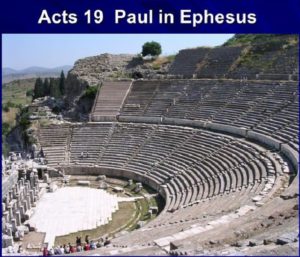
 “And now, behold, I know that you all among whom I went about preaching the kingdom of God, will see my face no longer. Therefore O call you to witness this day that I am innocent of the blood of all; for I have not shrunk from declaring to you the whole counsel of God. Take heed to yourselves and to the whole flock in which the Holy Spirit has placed you as bishops, to rule the Church of God, which he has purchased with his own blood. I know that after my departure fierce wolves will get in among you, and will not spare the flock. And from among your own selves men will rise speaking perverse things, to draw away the disciples after them. Watch, therefore, and remember that for three years night and day I did not cease with tears to admonish every one of you.
“And now, behold, I know that you all among whom I went about preaching the kingdom of God, will see my face no longer. Therefore O call you to witness this day that I am innocent of the blood of all; for I have not shrunk from declaring to you the whole counsel of God. Take heed to yourselves and to the whole flock in which the Holy Spirit has placed you as bishops, to rule the Church of God, which he has purchased with his own blood. I know that after my departure fierce wolves will get in among you, and will not spare the flock. And from among your own selves men will rise speaking perverse things, to draw away the disciples after them. Watch, therefore, and remember that for three years night and day I did not cease with tears to admonish every one of you. “And now I commend you to God and to the word of his grace, who is able to build up and to give the inheritance among all the sanctified. I have coveted no one’s silver or gold or apparel. You yourselves know that these hands of mine have provided for my needs and those of my companions. In all things I have shown you that by so toiling you ought to help the weak and remember the word of the Lord Jesus, that he himself said, “It is more blessed to give than to receive.”
“And now I commend you to God and to the word of his grace, who is able to build up and to give the inheritance among all the sanctified. I have coveted no one’s silver or gold or apparel. You yourselves know that these hands of mine have provided for my needs and those of my companions. In all things I have shown you that by so toiling you ought to help the weak and remember the word of the Lord Jesus, that he himself said, “It is more blessed to give than to receive.” There’s a soft, spiritual, and inspiring side to this part of the Old Testament and a hard, brutal, and violent side to the demise of the house of Achab (Israel’s former king along with his son Joram) and Ochozias the king of Juda.
There’s a soft, spiritual, and inspiring side to this part of the Old Testament and a hard, brutal, and violent side to the demise of the house of Achab (Israel’s former king along with his son Joram) and Ochozias the king of Juda. For the Lord had made them hear, in the camp of Syria, the noise of chariots, and of horses, and of a very great army…
For the Lord had made them hear, in the camp of Syria, the noise of chariots, and of horses, and of a very great army… Now the hard, brutal, and violent side to the demise of Achab and Ochozias and their legacies whether human or material:
Now the hard, brutal, and violent side to the demise of Achab and Ochozias and their legacies whether human or material: Eliseus the prophet called one of the sons of the prophet… take this little bottle of oil in thy hand… go to Ramoth Galaad… thou shalt see Jehu… thou shalt put it (the oil) on his head, and shalt say: Thus saith the Lord: I have anointed thee king over Israel, (the people of the Lord. And thou shalt cut off the house of Achab thy master)…
Eliseus the prophet called one of the sons of the prophet… take this little bottle of oil in thy hand… go to Ramoth Galaad… thou shalt see Jehu… thou shalt put it (the oil) on his head, and shalt say: Thus saith the Lord: I have anointed thee king over Israel, (the people of the Lord. And thou shalt cut off the house of Achab thy master)… Jehu bent his bow with his hand and shot Joram between the shoulders; and the arrow went out through his heart, and immediately he fell in his chariot.
Jehu bent his bow with his hand and shot Joram between the shoulders; and the arrow went out through his heart, and immediately he fell in his chariot. Jehu said…Throw her down headlong: and they threw her down, and the wall was sprinkled with her blood, and the hoofs of the horses trod upon her… It is the word of the Lord… In the field of Jezrahel the dogs shall eat the flesh of Jezabel, and the flesh of Jezabel shall be as dung upon the face of the earth… so that they who pass by shall say: Is this that same Jezabel?
Jehu said…Throw her down headlong: and they threw her down, and the wall was sprinkled with her blood, and the hoofs of the horses trod upon her… It is the word of the Lord… In the field of Jezrahel the dogs shall eat the flesh of Jezabel, and the flesh of Jezabel shall be as dung upon the face of the earth… so that they who pass by shall say: Is this that same Jezabel? And he (Jehu) wrote letters the second time to them saying: If you be mine, and will obey me, take the heads of the sons of your master, and come to me to Jezrahel by to morrow this time… And when the letters came to them (the chief men of the city), they took the king’s (Achab’s) sons, and slew seventy persons, and put their heads in baskets, and sent them to him (Jehu) in Jezrahel.
And he (Jehu) wrote letters the second time to them saying: If you be mine, and will obey me, take the heads of the sons of your master, and come to me to Jezrahel by to morrow this time… And when the letters came to them (the chief men of the city), they took the king’s (Achab’s) sons, and slew seventy persons, and put their heads in baskets, and sent them to him (Jehu) in Jezrahel. So Jehu slew all that were left of the house of Achab in Jezrahel, and all his chief men, and his friends, and his priests, till there were no remains left of him (Achab).
So Jehu slew all that were left of the house of Achab in Jezrahel, and all his chief men, and his friends, and his priests, till there were no remains left of him (Achab). Jehu to the people: Achab worshipped Baal a little, but I will worship him more… call to me all the prophets of Baal, and all his servants, and all his priests, let none be wanting, for I have a great sacrifice to offer Baal: whosoever shall be wanting shall not live. Now Jehu did this craftily, that he might destroy the worshippers of Baal… there was not one left that did not come… and Jehu and Jonadab… but that there be the servants of Baal only…
Jehu to the people: Achab worshipped Baal a little, but I will worship him more… call to me all the prophets of Baal, and all his servants, and all his priests, let none be wanting, for I have a great sacrifice to offer Baal: whosoever shall be wanting shall not live. Now Jehu did this craftily, that he might destroy the worshippers of Baal… there was not one left that did not come… and Jehu and Jonadab… but that there be the servants of Baal only… So Jehu destroyed Baal out of Israel; but yet he departed not from the sins of Jeroboam… who made Israel sin, nor did he forsake the golden calves that were in Bethel and Dan…
So Jehu destroyed Baal out of Israel; but yet he departed not from the sins of Jeroboam… who made Israel sin, nor did he forsake the golden calves that were in Bethel and Dan… Amidst this two-sided section of the Old Testament is a lot of confusion on my part:
Amidst this two-sided section of the Old Testament is a lot of confusion on my part: And for a short period of time there were two kings of Israel—Joram, Achab’s son and Jehu, courtesy of Eliseus the prophet and God, of course.
And for a short period of time there were two kings of Israel—Joram, Achab’s son and Jehu, courtesy of Eliseus the prophet and God, of course.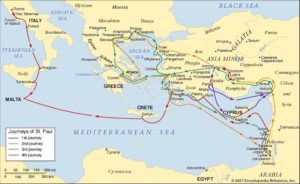 It’s time for Paul to come home to Jerusalem where it all started with Christ’s Resurrection. After a year and a half in Corinth and three years with the Ephesians, Paul wants to be in Jerusalem by Pentecost.
It’s time for Paul to come home to Jerusalem where it all started with Christ’s Resurrection. After a year and a half in Corinth and three years with the Ephesians, Paul wants to be in Jerusalem by Pentecost. And when we could not persuade him, we acquiesced and said. “The Lord’s will be done.” After this we made our preparations and went our way to Jerusalem.
And when we could not persuade him, we acquiesced and said. “The Lord’s will be done.” After this we made our preparations and went our way to Jerusalem. So do what we tell thee. We have four men who are under a vow; take them and sanctify thyself along with them, and pay for them that they may shave their heads; and all will know that what they heard of thee is false, but that thou thyself also observes the Law.
So do what we tell thee. We have four men who are under a vow; take them and sanctify thyself along with them, and pay for them that they may shave their heads; and all will know that what they heard of thee is false, but that thou thyself also observes the Law.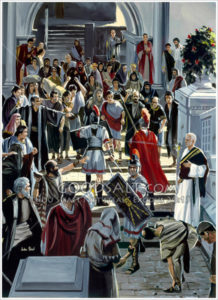 …seizing Paul, they proceeded to drag him out of the temple… They were trying to kill him… and when they saw the tribune and the soldiers, they stopped beating Paul… shouting, “Away with him!”
…seizing Paul, they proceeded to drag him out of the temple… They were trying to kill him… and when they saw the tribune and the soldiers, they stopped beating Paul… shouting, “Away with him!”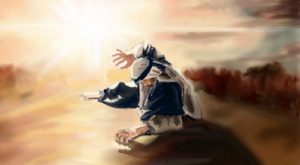 Paul: “And it came to pass that, as I was on my way and approaching Damascus, suddenly about noon there shone round about me a great light from heaven: and I fell to the ground and heard a voice saying to me:
Paul: “And it came to pass that, as I was on my way and approaching Damascus, suddenly about noon there shone round about me a great light from heaven: and I fell to the ground and heard a voice saying to me: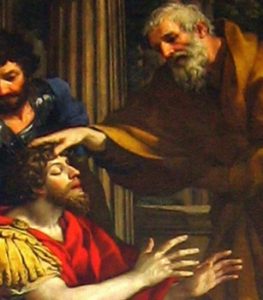 Paul: “Now one Ananias, an observer of the Law… came to me…
Paul: “Now one Ananias, an observer of the Law… came to me… The Lord Jesus: “Go, for to the Gentiles far away I will send thee.”
The Lord Jesus: “Go, for to the Gentiles far away I will send thee.” The next day, as he wished to find out the real reason why he was accused by the Jews, he loosed him and ordered the priests and all the Sanhedrin to assemble; and taking Paul forth, he placed him in front of them.
The next day, as he wished to find out the real reason why he was accused by the Jews, he loosed him and ordered the priests and all the Sanhedrin to assemble; and taking Paul forth, he placed him in front of them.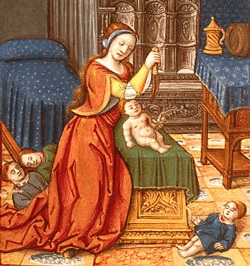 A ruthless mother rules while her daughter hides her grandson to become the king later on at the age of seven. Joiada the priest protects the young ruler and together they restore the temple in Jerusalem:
A ruthless mother rules while her daughter hides her grandson to become the king later on at the age of seven. Joiada the priest protects the young ruler and together they restore the temple in Jerusalem: Now Joas was seven years old, when he began to reign.
Now Joas was seven years old, when he began to reign.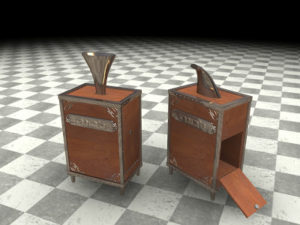 For it (the money collected in the chest) was given to them that did the work, that the temple of the Lord might be repaired… they bestowed it faithfully…
For it (the money collected in the chest) was given to them that did the work, that the temple of the Lord might be repaired… they bestowed it faithfully… And the rest of the acts of Azarias, and all that he did, are they not written in the book of the words of the days of the kings of Juda?
And the rest of the acts of Azarias, and all that he did, are they not written in the book of the words of the days of the kings of Juda?
 Paul’s Roman citizenship saves him from doom in Jerusalem with the Sanhedrin. Instead of possible death he is transferred to Caesarea to be tried in front of the sympathetic, yet politically astute governor Felix. The trial is adjourned awaiting the presence of the tribune from Jerusalem.
Paul’s Roman citizenship saves him from doom in Jerusalem with the Sanhedrin. Instead of possible death he is transferred to Caesarea to be tried in front of the sympathetic, yet politically astute governor Felix. The trial is adjourned awaiting the presence of the tribune from Jerusalem.  For the Sadducees say that there is no resurrection, and that there are no angels or spirits, whereas the Pharisees believe in both.
For the Sadducees say that there is no resurrection, and that there are no angels or spirits, whereas the Pharisees believe in both. The tribune to two centurions: “get ready… to mount Paul and take him in safety to Felix the governor (in Caesarea).”
The tribune to two centurions: “get ready… to mount Paul and take him in safety to Felix the governor (in Caesarea).” Now five days later the high priest Ananias came down with some of the elders and one Tertullus, an attorney; and they presented their case against Paul before the governor.
Now five days later the high priest Ananias came down with some of the elders and one Tertullus, an attorney; and they presented their case against Paul before the governor. Felix, however, having precise information about the Way, adjourned the trial, saying, “When Lysias the tribune comes down, I will decide your case.”
Felix, however, having precise information about the Way, adjourned the trial, saying, “When Lysias the tribune comes down, I will decide your case.” “The Way” is referenced numerous times in these passages while the Lord stood by Paul and told him: “Be steadfast; for just as thou hast borne witness to me in Jerusalem, bear witness in Rome also.”
“The Way” is referenced numerous times in these passages while the Lord stood by Paul and told him: “Be steadfast; for just as thou hast borne witness to me in Jerusalem, bear witness in Rome also.”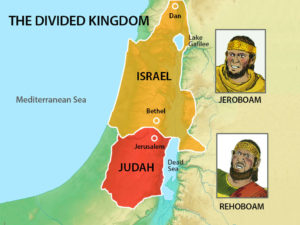 Israel split into two countries—Israel including Samaria in the North and Juda including Jerusalem in the South. The Juda and Israel kingships always referenced each other to one another, it was sort of a dance back and forth to time-stamp the changes in leadership with the wildcard always being Assyria:
Israel split into two countries—Israel including Samaria in the North and Juda including Jerusalem in the South. The Juda and Israel kingships always referenced each other to one another, it was sort of a dance back and forth to time-stamp the changes in leadership with the wildcard always being Assyria: Against him came up Salmanasar king of the Assyrians, and Osee became his servant, and paid him tribute… And in the ninth year of Osee, the king of the Assyrians took Samaria, and carried Israel away to Assyria…
Against him came up Salmanasar king of the Assyrians, and Osee became his servant, and paid him tribute… And in the ninth year of Osee, the king of the Assyrians took Samaria, and carried Israel away to Assyria… And the king of the Assyrians brought people from Babylon, Cutha, Avah, Emath, and from Sepharvaim: and placed them in the cities of Samaria instead of the children of Israel… and when they began to dwell there, they feared not the Lord: and the Lord sent lions among them, which killed them… so one of the priests who had been carries away captive from Samaria, came and dwelt in Bethel (in Samaria), and taught them how they should worship the Lord… And when they worshipped the Lord, they served also their own gods according to the custom of the nations out of which they were brought to Samaria. Unto this day they follow the old manner (the way of the nations): they fear not the Lord…
And the king of the Assyrians brought people from Babylon, Cutha, Avah, Emath, and from Sepharvaim: and placed them in the cities of Samaria instead of the children of Israel… and when they began to dwell there, they feared not the Lord: and the Lord sent lions among them, which killed them… so one of the priests who had been carries away captive from Samaria, came and dwelt in Bethel (in Samaria), and taught them how they should worship the Lord… And when they worshipped the Lord, they served also their own gods according to the custom of the nations out of which they were brought to Samaria. Unto this day they follow the old manner (the way of the nations): they fear not the Lord…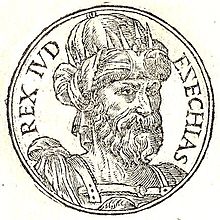 He (Ezechias) trusted in the Lord the God of Israel: so that after him there was none like him among the kings of Juda, nor any of them that were before him… he behaved himself wisely. And he rebelled against the king of the Assyrians, and served him not. He smote the Philistines as far as Gaza…
He (Ezechias) trusted in the Lord the God of Israel: so that after him there was none like him among the kings of Juda, nor any of them that were before him… he behaved himself wisely. And he rebelled against the king of the Assyrians, and served him not. He smote the Philistines as far as Gaza…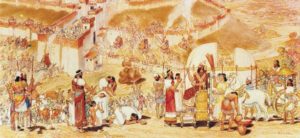 …On whom dost thou trust, that thou darest to rebel (against Assyria)? Dost thou trust in Egypt?… But if you say to me: We trust in the Lord our God: Is it not he, whose high places and altars Ezechias hath taken away?… Now therefore come over to my master the king of the Assyrians… Is it without the will of the Lord that I am to come up to this place to destroy it? The Lord said to me: Go up to this land and destroy it… Let not Ezechias deceive you: for he shall not be able to deliver you out of my hand… Do not hearken to Ezechias… and you shall live, and not die…
…On whom dost thou trust, that thou darest to rebel (against Assyria)? Dost thou trust in Egypt?… But if you say to me: We trust in the Lord our God: Is it not he, whose high places and altars Ezechias hath taken away?… Now therefore come over to my master the king of the Assyrians… Is it without the will of the Lord that I am to come up to this place to destroy it? The Lord said to me: Go up to this land and destroy it… Let not Ezechias deceive you: for he shall not be able to deliver you out of my hand… Do not hearken to Ezechias… and you shall live, and not die…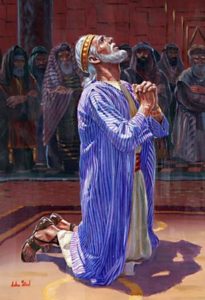 And when the king Ezechias heard these words, he rent his garments, and covered himself with sackcloth, and went into the house of the Lord. And he sent Eliacim to Isaias the prophet… and they said to him: Thus said Ezechias: This day is a day of tribulation, and of rebuke, and of blasphemy: the children are come to the birth, and the woman in travail hath not strength. It may be the Lord thy God will hear all the words of Rabsaces… and do thou offer prayer for the remnants that are found.
And when the king Ezechias heard these words, he rent his garments, and covered himself with sackcloth, and went into the house of the Lord. And he sent Eliacim to Isaias the prophet… and they said to him: Thus said Ezechias: This day is a day of tribulation, and of rebuke, and of blasphemy: the children are come to the birth, and the woman in travail hath not strength. It may be the Lord thy God will hear all the words of Rabsaces… and do thou offer prayer for the remnants that are found.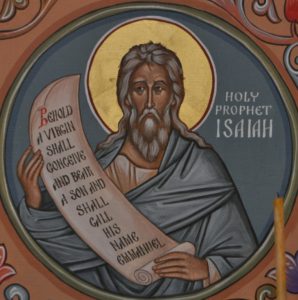 Isaias the Prophet (God) to Ezechias: I have heard the prayer thou hast made to me concerning Sennacherib king of the Assyrians… (relating the Lord thy God’s perspective on Sennacherib): Against the holy one of Israel… they became like the grass of the field… which withered before it came to maturity… Thou hast been mad against me, and thy pride hath come up to my ears… and I will turn thee back by the way, by which thou camest…
Isaias the Prophet (God) to Ezechias: I have heard the prayer thou hast made to me concerning Sennacherib king of the Assyrians… (relating the Lord thy God’s perspective on Sennacherib): Against the holy one of Israel… they became like the grass of the field… which withered before it came to maturity… Thou hast been mad against me, and thy pride hath come up to my ears… and I will turn thee back by the way, by which thou camest… Make a note to self: prayer does indeed work!
Make a note to self: prayer does indeed work! Isaias to Ezechias: Wilt thou that the shadow go forward ten lines, or that it go back so many degrees? … (Ezechias) let it return back ten degrees… And Isaias the prophet called upon the Lord, and he brought the shadow ten degrees backwards by the lines, by which it had already gone down in the dial of Achaz.
Isaias to Ezechias: Wilt thou that the shadow go forward ten lines, or that it go back so many degrees? … (Ezechias) let it return back ten degrees… And Isaias the prophet called upon the Lord, and he brought the shadow ten degrees backwards by the lines, by which it had already gone down in the dial of Achaz.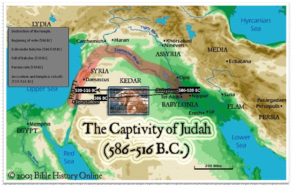 Ezechias to Isaias (God): The word of the Lord, which thou hast spoken, is good: let peace and truth be in my days.
Ezechias to Isaias (God): The word of the Lord, which thou hast spoken, is good: let peace and truth be in my days. Isn’t that the essence of what Paul is professing to the Jews? That the resurrection of Jesus Christ was foretold in the Old Testament and simply a continuation of their religion, not necessarily a whole new religion?
Isn’t that the essence of what Paul is professing to the Jews? That the resurrection of Jesus Christ was foretold in the Old Testament and simply a continuation of their religion, not necessarily a whole new religion? Paul: “Neither against the Law of the Jews not against the temple nor against Caesar have I committed any offense.”
Paul: “Neither against the Law of the Jews not against the temple nor against Caesar have I committed any offense.” King Agrippa: “I myself also could have wished to hear this man.”
King Agrippa: “I myself also could have wished to hear this man.”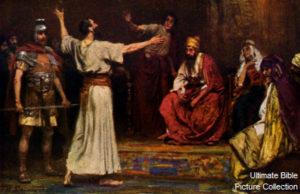 Afterwards Governor Festus questions if Paul is ‘mad,’ and Paul’s response is that he is “not mad but I speak words of sober truth.” The truth can only be spoken in the abstinence of our denial, justification, and rationalization of the events of our lives.
Afterwards Governor Festus questions if Paul is ‘mad,’ and Paul’s response is that he is “not mad but I speak words of sober truth.” The truth can only be spoken in the abstinence of our denial, justification, and rationalization of the events of our lives. Paul (His persecution of Christians): …according to the strictest sect of our religion I lived a Pharisee… And I then thought it my duty to do many things contrary to the name of Jesus of Nazareth… many of the saints I shut up in prison… and when they were put to death I cast my vote against them… Often times in synagogues I punished them and tried to force them to blaspheme; and in my extreme rage against them I even pursued them to foreign cities.
Paul (His persecution of Christians): …according to the strictest sect of our religion I lived a Pharisee… And I then thought it my duty to do many things contrary to the name of Jesus of Nazareth… many of the saints I shut up in prison… and when they were put to death I cast my vote against them… Often times in synagogues I punished them and tried to force them to blaspheme; and in my extreme rage against them I even pursued them to foreign cities.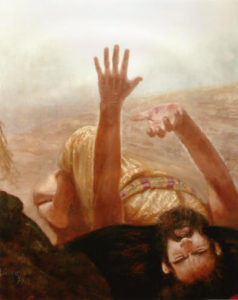 I have appeared before thee for this purpose, to appoint thee to be a minister and a witness to what thou hast seen, and to the visions that thou shalt have of me; delivering thee from the people and from the nations, to whom I am now sending thee, to open their eyes that they may turn from darkness to light and from the dominion of Satan to God; that they may receive forgiveness of sins and an inheritance among those sanctified by faith in me.’”
I have appeared before thee for this purpose, to appoint thee to be a minister and a witness to what thou hast seen, and to the visions that thou shalt have of me; delivering thee from the people and from the nations, to whom I am now sending thee, to open their eyes that they may turn from darkness to light and from the dominion of Satan to God; that they may receive forgiveness of sins and an inheritance among those sanctified by faith in me.’” Paul to King Agrippa: “Dost thou believe in the prophets? I know thou dost.”
Paul to King Agrippa: “Dost thou believe in the prophets? I know thou dost.” These five chapters are the END of The Fourth Book of Kings which continued the history of the two hostile kingdoms, Israel and Juda, up to their captivity. The Assyrians in 722 B.C. led Israel away; the Babylonians in 586 B.C. led Juda into captivity.
These five chapters are the END of The Fourth Book of Kings which continued the history of the two hostile kingdoms, Israel and Juda, up to their captivity. The Assyrians in 722 B.C. led Israel away; the Babylonians in 586 B.C. led Juda into captivity. Maybe I answered my own question in that good and evil can skip generations no matter the environment, times (biblical or present day), or how great a childhood the future king had.
Maybe I answered my own question in that good and evil can skip generations no matter the environment, times (biblical or present day), or how great a childhood the future king had. Two and twenty years old was Amon when he began to reign, and he reigned two years in Jerusalem… And he did evil in the sight of the Lord… And his servants plotted against him, and slew the king in his own house… and his son Josais reigned in his stead.
Two and twenty years old was Amon when he began to reign, and he reigned two years in Jerusalem… And he did evil in the sight of the Lord… And his servants plotted against him, and slew the king in his own house… and his son Josais reigned in his stead. The Lord the God of Israel to Helcias the priest (through Holda): Behold, I will bring evils upon this place, and upon the inhabitants thereof, all the words of the law which the king of Juda hath read, because they have forsaken me, and sacrificed to strange gods, provoking me by all the works of their hands: therefore my indignation shall be kindled against this place, and shall not be quenched…
The Lord the God of Israel to Helcias the priest (through Holda): Behold, I will bring evils upon this place, and upon the inhabitants thereof, all the words of the law which the king of Juda hath read, because they have forsaken me, and sacrificed to strange gods, provoking me by all the works of their hands: therefore my indignation shall be kindled against this place, and shall not be quenched… Wow, Josais found the Book of the Covenant, read it to his people, yet still failed in the eyes of the Lord? I guess even with good leadership the flock can underperform. Josais reward? Gets to pass on before it gets ugly for Juda.
Wow, Josais found the Book of the Covenant, read it to his people, yet still failed in the eyes of the Lord? I guess even with good leadership the flock can underperform. Josais reward? Gets to pass on before it gets ugly for Juda. Joakim was five and twenty years old when he began to reign: and he reigned eleven years in Jerusalem… And he did evil before the Lord according to all that his fathers had done.
Joakim was five and twenty years old when he began to reign: and he reigned eleven years in Jerusalem… And he did evil before the Lord according to all that his fathers had done. And he (king Joachin of Jerusalem now exiled in Babylon) appointed Matthanias his uncle in his stead: and he called his name Sedecias. Sedecias was one and twenty years old when he began his reign, and he reigned eleven years in Jerusalem… And he did evil before the Lord, according to all that Joakim (his brother?) had done.’
And he (king Joachin of Jerusalem now exiled in Babylon) appointed Matthanias his uncle in his stead: and he called his name Sedecias. Sedecias was one and twenty years old when he began his reign, and he reigned eleven years in Jerusalem… And he did evil before the Lord, according to all that Joakim (his brother?) had done.’ …came Nabuzardan commander of the (Babylon) army into Jerusalem. And he burnt the house of the Lord, and the king’s house, and the houses of Jerusalem, and every house he burnt with fire. And all the army of Chaldees… broke down the walls of Jerusalem round about… and carried away the rest of the people that remained in the city… But the poor of the land he left some dressers of vines and husbandmen.
…came Nabuzardan commander of the (Babylon) army into Jerusalem. And he burnt the house of the Lord, and the king’s house, and the houses of Jerusalem, and every house he burnt with fire. And all the army of Chaldees… broke down the walls of Jerusalem round about… and carried away the rest of the people that remained in the city… But the poor of the land he left some dressers of vines and husbandmen. Seraias the chief priest (and seventy-two leaders)…these Nabuzardan took away and carried them to the king of Babylon (Nabuchadonosor)… And the king of Babylon smote them, and slew them… so Juda was carried away out of their land.
Seraias the chief priest (and seventy-two leaders)…these Nabuzardan took away and carried them to the king of Babylon (Nabuchadonosor)… And the king of Babylon smote them, and slew them… so Juda was carried away out of their land. Evilmerodach king of Babylon, in the year that he began to reign, lifted up the head of Joachin king of Juda out of prison… And he appointed him a continual allowance, which was also given him by the king day by day, all the days of his life.
Evilmerodach king of Babylon, in the year that he began to reign, lifted up the head of Joachin king of Juda out of prison… And he appointed him a continual allowance, which was also given him by the king day by day, all the days of his life.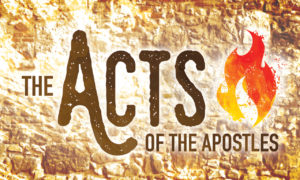 These last two chapters of the Acts of the Apostles are amazing verse and a final look at the heart of Paul trying to convince the Jews that the resurrection of Jesus Christ logically followed the Law of Moses and from what the prophets had prophesied.
These last two chapters of the Acts of the Apostles are amazing verse and a final look at the heart of Paul trying to convince the Jews that the resurrection of Jesus Christ logically followed the Law of Moses and from what the prophets had prophesied.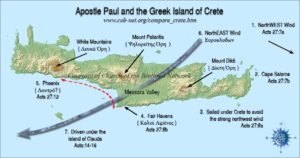 Paul: “Men, I see that this voyage is threatening to bring disaster and heavy loss, not only to the cargo and the ship, but to our lives also.”
Paul: “Men, I see that this voyage is threatening to bring disaster and heavy loss, not only to the cargo and the ship, but to our lives also.”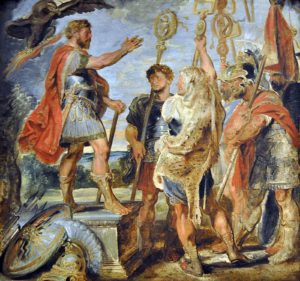 But as the sailors were trying to escape from the ship and had lowered the boat into the sea… Paul to the centurion and the soldiers: “Unless these men remain in the ship, you cannot be saved.” Then the soldiers cut away the ropes of the boat and let her drift off.
But as the sailors were trying to escape from the ship and had lowered the boat into the sea… Paul to the centurion and the soldiers: “Unless these men remain in the ship, you cannot be saved.” Then the soldiers cut away the ropes of the boat and let her drift off. This reminds me of the Seinfeld episode where Kramer is driving the bus and still making all the stops while being robbed and fighting off the robber. When asked how he could do that, he replied ‘because they kept ringing the (stop) bells!
This reminds me of the Seinfeld episode where Kramer is driving the bus and still making all the stops while being robbed and fighting off the robber. When asked how he could do that, he replied ‘because they kept ringing the (stop) bells!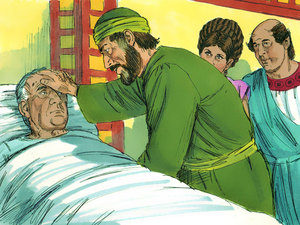 The head man of the island, whose name was Publius… And it happened that the father of Publius was laid up with fever and dysentery, but Paul went in, and after praying and laying hands on him, he healed him. After this all the sick on the island came and were cured; and they honored us with many marks of honor, and when we sailed, they provided us with such things as we needed.
The head man of the island, whose name was Publius… And it happened that the father of Publius was laid up with fever and dysentery, but Paul went in, and after praying and laying hands on him, he healed him. After this all the sick on the island came and were cured; and they honored us with many marks of honor, and when we sailed, they provided us with such things as we needed.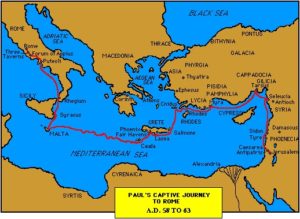 Paul to the leading Jews in Rome: “Brethren, although I have done nothing against the people or against the customs of our fathers, yet I was handed over to the Romans as a prisoner from Jerusalem. After an examination they were ready to release me, since I was innocent of any crime that deserved death; but as the Jews objected, I was forced to appeal to Caesar—not that I had any charge to bring against my nation. This, then, is why I asked to see you and speak with you. For it is because of the hope of Israel that I am wearing this chain.”
Paul to the leading Jews in Rome: “Brethren, although I have done nothing against the people or against the customs of our fathers, yet I was handed over to the Romans as a prisoner from Jerusalem. After an examination they were ready to release me, since I was innocent of any crime that deserved death; but as the Jews objected, I was forced to appeal to Caesar—not that I had any charge to bring against my nation. This, then, is why I asked to see you and speak with you. For it is because of the hope of Israel that I am wearing this chain.”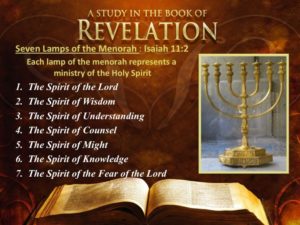 Paul: “Well, did the Holy Spirit speak through Isaias the prophet to our fathers, saying, ‘Go to this people and say: With your ear you will hear and will not understand; and seeing you will see and will not perceive. For the heart of this people has been hardened, and with their ears they have been hard of hearing, and their eyes they have closed; lest perhaps they see with their eyes, and hear with their ears, and understand with their heart, and be converted, and I will heal them.’ Be it known that the salvation of God has been sent to the Gentiles, and they will listen to it.”
Paul: “Well, did the Holy Spirit speak through Isaias the prophet to our fathers, saying, ‘Go to this people and say: With your ear you will hear and will not understand; and seeing you will see and will not perceive. For the heart of this people has been hardened, and with their ears they have been hard of hearing, and their eyes they have closed; lest perhaps they see with their eyes, and hear with their ears, and understand with their heart, and be converted, and I will heal them.’ Be it known that the salvation of God has been sent to the Gentiles, and they will listen to it.”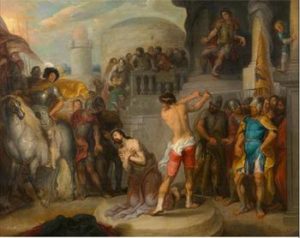 Amen indeed! The ongoing dialogue with the Jews is quite amazing as well. Paul utilizing the words of the prophet Isaias summarizing and concluding the conversation with ‘you either get it or you don’t’ or even better ‘it’s the Will of God that you either get or you don’t.’ No hard feelings either way but there is salvation for all of eternity to be received but in only one manner of the exercising of one’s own free will. It’s a dialogue that is still quite applicable today in not only religious discussions but also spiritual ones and pretty much any secular discussion.
Amen indeed! The ongoing dialogue with the Jews is quite amazing as well. Paul utilizing the words of the prophet Isaias summarizing and concluding the conversation with ‘you either get it or you don’t’ or even better ‘it’s the Will of God that you either get or you don’t.’ No hard feelings either way but there is salvation for all of eternity to be received but in only one manner of the exercising of one’s own free will. It’s a dialogue that is still quite applicable today in not only religious discussions but also spiritual ones and pretty much any secular discussion.